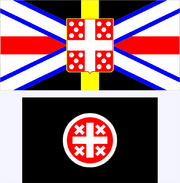
Above: Flag of the Commonwealth of Great Britain adopted in 1817, the first country to be founded on Cromwellingtonist principles. Below: Internationally recognized flag of Cromwellingtonism.
Cromwellingtonism is a political and social ideology promoting radical authoritarian nationalism. It is named after both Oliver Cromwell and Arthur Wellington. Cromwellingtonists seek to unify their nation based upon suprapersonal connections of ancestry and culture through a totalitarian state that seeks the mass mobilization of the national community through discipline, indoctrination, physical training, and economic corporatism. Cromwellingtonism utilizes a vanguard party, or a popular leader, to initiate a revolution to organize the nation upon Cromwellingtonist principles. This vanguard party and the state are led by a supreme leader who exercises a dictatorship over the party, military, government, and other state institutions. Cromwellingtonism views direct action including physical violence and war, as a means to achieve national rejuvenation, spirit, and vitality.
Cromwellingtonism recognizes the existence of class conflict in societies, and advocates a resolution to end the division of classes and secure national solidarity. However Cromwellingtonism publicly favors proletarian culture, and claims that cultural nationalization of society emancipates the nation's proletariat, and promotes the assimilation of all classes into a proletarian nation. Because of these views on class, Cromwellingtonism is often considered a variation of socialist ideology. It also promotes solidarity with foreign proletariat in their struggle to bring about revolution, while at the same time keeping nationalism alive.
Cromwellingtonism advocates a state-controlled and regulated mixed economy; the principle economic goal of Cromwellingtonism is to achieve national self-sufficiency and independence and to promote the needs of the state, through protectionist and interventionist economic policies. It promotes regulated private enterprise and private property contingent whenever beneficial to the nation and state enterprise and state property whenever necessary to protect its influences. This leaves private property and companies under Cromwellingtonism to be potentionally nationalized at any moment.

Arthur Wellington (1769-1847), first Chancellor of the Commonwealth of Great Britain and one of the namesakes of Cromwellingtonism
Cromwellingtonism was founded in Great Britain in the early 1810s, after the Second Seven Years War. It's first main leader was former general and Prime Minister Arthur Wellesley (later changed to Arthur Wellington), who led the October Revolution of 1817 which abolished the British monarchy and formed the first ever Cromwellingtonist state, the Commonwealth of Great Britain. Wellington became it's first Chancellor, and ruled until his death in 1847. There has yet to be another government based on Cromwellingtonism, although the movement has gained influence in the Democracy of South Carolina, the Republic of Georgia, and in the late 1820s the Peninsular War was fought in Portugal by an international coalition to stop a Cromwellingtonist funded revolution. Cromwellingtonism opposes multiple ideologies, including liberalism, democracy, republicanism, Smithism, conservatism, and monarchy.